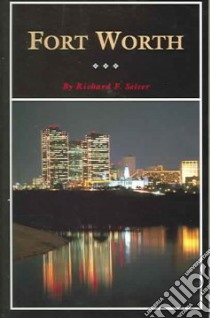Fort Worth - 9780876111970
Un libro in lingua di Selcer Richard F. edito da Texas State Historical Assn, 2004
- € 9.00
- Il prezzo è variabile in funzione del cambio della valuta d’origine
Fort Worth has been called "the City Where the West Begins," "Cowtown," and the silent partner in the Dallas/Fort Worth Metroplex. None of these descriptions quite tells the story of this city and its people. Since its founding in the mid-nineteenth century as a military outpost, Fort Worth has gone through many phasescattle, oil, aviation, and tourist. The little village on the Trinity has grown up to become a global city that is a melting pot of economic forces and diverse cultures.
At its most basic, Fort Worth's history is the story of leadership, of how men and women of vision built a flourishing community at a river crossing on the north Texas plains. Through troubled timesthe 1850s, the Civil War, the 1930s, the 1970sthe leadership kept its eye on the future. The city pulled itself through the down timesand put itself on the mapby visionary projects like the railroad, the Spring Palace, the Stockyards, Camp Bowie, the Bomber Plant, and Sundance Square. This book helps to put a modern face on Fort Worth, move it out of the shadow of Dallas, and place it firmly in the twenty-first century.
The book is illustrated with many historic photographs, including: a pair of Wichita Indians; Main Street in old Fort Worth; the current Tarrant County Courthouse, under construction in 1895; Fort Worth Medical College, opening in 1893 as just the third medical school in Texas; Fort Worth's Meacham Field in its early years (ca. 1926) and Meacham field in 1937; the Boeing B-29 and the Convair B-36 side by side at Carswell Air Force Base; Pig Stand drive-ins; the Fort Worth Cats and their opponents, the Memphis Chicks; the Light Crust Doughboys Western swing band in the 1940s; Six Flags over Texas; the "Bombardier 500" race; William B. McDonald, successful African American businessman and political leader; the Woman's Wednesday Club in its weekly luncheon meeting at the Metropolitan Hotel, 1918; the flood of 1949; Sundance Square, looking west across Main Street in the 1980s; and African American drover Chester Stidham with the "Fort Worth Herd" of longhorns.
Also enlivening the text are various sidebars giving detailed information about "Fort Worth's Most Historic Cemeteries," "Courthouse Square," "The Cultural District," "Sundance Square," and "The Historic North Side."
At its most basic, Fort Worth's history is the story of leadership, of how men and women of vision built a flourishing community at a river crossing on the north Texas plains. Through troubled timesthe 1850s, the Civil War, the 1930s, the 1970sthe leadership kept its eye on the future. The city pulled itself through the down timesand put itself on the mapby visionary projects like the railroad, the Spring Palace, the Stockyards, Camp Bowie, the Bomber Plant, and Sundance Square. This book helps to put a modern face on Fort Worth, move it out of the shadow of Dallas, and place it firmly in the twenty-first century.
The book is illustrated with many historic photographs, including: a pair of Wichita Indians; Main Street in old Fort Worth; the current Tarrant County Courthouse, under construction in 1895; Fort Worth Medical College, opening in 1893 as just the third medical school in Texas; Fort Worth's Meacham Field in its early years (ca. 1926) and Meacham field in 1937; the Boeing B-29 and the Convair B-36 side by side at Carswell Air Force Base; Pig Stand drive-ins; the Fort Worth Cats and their opponents, the Memphis Chicks; the Light Crust Doughboys Western swing band in the 1940s; Six Flags over Texas; the "Bombardier 500" race; William B. McDonald, successful African American businessman and political leader; the Woman's Wednesday Club in its weekly luncheon meeting at the Metropolitan Hotel, 1918; the flood of 1949; Sundance Square, looking west across Main Street in the 1980s; and African American drover Chester Stidham with the "Fort Worth Herd" of longhorns.
Also enlivening the text are various sidebars giving detailed information about "Fort Worth's Most Historic Cemeteries," "Courthouse Square," "The Cultural District," "Sundance Square," and "The Historic North Side."
Informazioni bibliografiche
- Titolo del Libro in lingua: Fort Worth
- Sottotitolo: A Texas Original!
- Lingua: English
- Autore: Selcer Richard F.
- Editore: Texas State Historical Assn
- Collana: Texas State Historical Assn (Paperback)
- Data di Pubblicazione: 01 Novembre '04
- Genere: HISTORY
- Pagine: 143
- Dimensioni mm: 215 x 139 x 12
- ISBN-10: 0876111975
- EAN-13: 9780876111970


